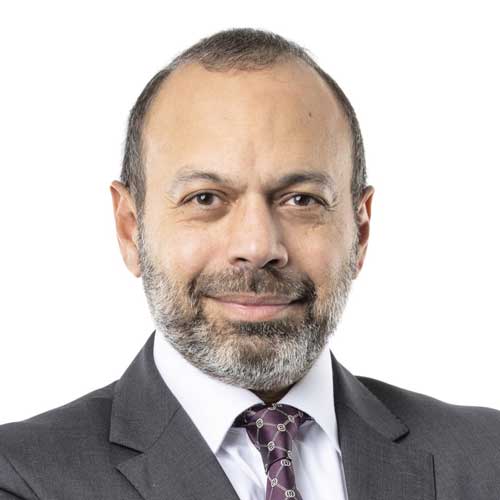ABSA REGIONAL OPERATIONS: Human-Centred Absa Closer to Clients
Absa is changing and adapting. The bank, with roots going back to 1986 in South Africa and a legacy of over 100 years across the Absa Regional Operations (ARO) countries, has been a frontrunner in the financial services sector for decades. An innovative spirit, and a willingness to push pioneering ideas, have helped Absa to grow and build. All the while, the bank has maintained strong ties with clients, and now more than ever Absa recognises that every story counts as it looks to broaden its product and service portfolio to meet the needs of a changing Africa.
Questions by Enterprise Africa | Answers by Omar Baig, Managing Executive: Absa Regional Operations (ARO), Retail & Business Banking
By delivering customer-centric design across its product suite to bring real life impact for clients, Absa is innovating and adapting to ensure it remains deliberately different from other banks across sub-Saharan Africa. Omar Baig, Managing Executive: Retail & Business Banking for Absa Regional Operations, explains that the bank is consistently and curiously listening to client stories to ensure it can serve effectively.
How is the product portfolio developing today?
There’s been a big emphasis on moving away from what we think clients want to getting a much deeper understanding of what clients are looking for, understanding their specific pain points and how we can solve for them. We’ve tried to reestablish ourselves as more of a local bank that understands its customer’s needs, an African bank, and I think we’ve been successful. We have become more relevant regionally and are focusing on specific client needs and less on homogeneous offerings. This has been the mindset that we’ve taken to enhancing our product suite and bringing new capabilities into the market.
One example is Absa’s Women in Business. We recognise that women are significant drivers of the economy and society and have a large role to play on the economic and social development of the continent. We’ve come up with an offering that is specifically tailored to women entrepreneurs, with dedicated relationship managers who have a comprehensive understanding of what this specific segment might need, and we have broadened our offerings to include things like training and networking to help open new markets. We are now live with this in six of our markets and we will embed in the remaining markets soon.
We are also active in the payment space, trying to get more SMEs into the formal payment system. One of the barriers to entry has been the cost of being part of that payment acquiring ecosystem. So, we launched an innovative product called Mobi Tap, which converts an Android phone into a payment acceptance device.
Not only do we provide the capability, but we also sourced the devices in bulk and this enables us to offer them to our SME merchants at a fraction of the cost of a regular point-of-sale (POS) device. In many of our markets, we are providing the tech free of charge based on merchants hitting certain activity thresholds. We have also expanded our payments acceptance to accept digital wallet payments as that is what the users wanted from us. It’s a much larger channel of payment for a lot of consumers compared to plastic. This has been well received, both with the SME clients that we serve as well as their customer base.
How are you supporting ambitious SMEs in sub-Saharan Africa?
Our approach is to make sure that we are as close to our clients as possible so that we can understand their pain points and innovate quickly to launch the solutions they want.
With Women in Business and our other programmes, we provided training for about 30,000 SMEs in 2024 across our markets. We even took a client delegation to China to connect with suppliers as part of one of our Absa Business Clubs, and we do this with the help of strong partnerships. Similarly in Ghana, we’re working with the MasterCard Foundation which enables us to lend to SMEs at significantly below market interest rates and that has been extremely successful.
In some of our other markets, we’re partnering with the likes of DHL, where we’ve just established a regional partnership with two primary objectives. One is to provide training, business development, and support for SMEs. The second priority is access to underlying trade products and services, leveraging DHL’s capability across the continent.
We also have strong ties with various Development Finance Institutions (DFIs) as well as the International Finance Corporation (IFC) and the wider World Bank that enables us to broaden the base of customers we serve and provide relevant financial products and services.
What is absolutely critical is to be close to the client and be extremely responsive. Only then can you understand what their needs are and adapt and tailor your products and services to come up with new solutions for specific needs. This is the commitment our new brand positioning – Your Story Matters – launched in early 2024 speaks to. It’s our commitment to being empathetic to our customers’ needs, while delivering seamless intuitive banking experiences.
What is next? How are you staying ahead of the rest?
A lot of our focus is on digitising, which makes a lot of sense in the context of the markets we play in and given the fact that Africa is the leader in digital banking globally.
We are currently working on a Super App for SME clients and our merchant base which will allow them to start with a payment acceptance device at its core, but then expand into banking services and value-added services. They can choose from a whole host of services without necessarily having to become a primary account holder. We can then layer it with, for example, a reward or an incentive programme. This concept is currently in development and testing in one of our markets before we roll out further afield.
We also recently launched a wealth offering catering for the sub-Saharan region in Africa. It was initially focused on South Africa, but we’ve rolled out our first offshore centre in Mauritius and that’s a nice tie in because we see a lot of our business clientele as the primary customers.
We’ve also just taken our new Absa Business Banking Credit Card to market in Kenya – it will be going live in the rest of our markets in Q1 2025 following the successful pilot. There’s a lot of work happening in making sure that we continue to stay relevant. We continue to innovate so that we are always responsive to our customers’ needs and are putting significant investments in our business going forward.
Content sponsored by Absa Regional Operations


